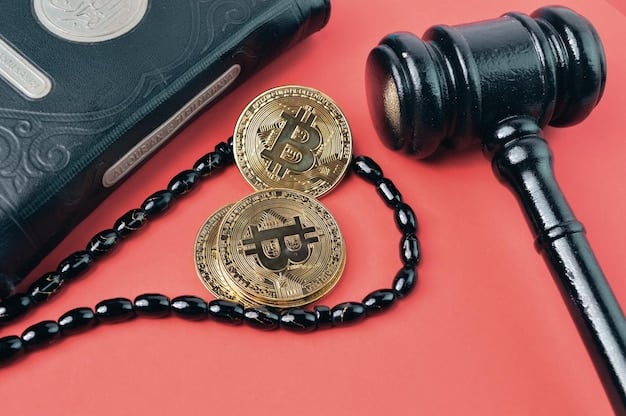Blockchain Gaming Risks: Legal and Financial Pitfalls in US Games

Blockchain gaming risks involve potential legal and financial pitfalls arising from the integration of NFTs and cryptocurrencies into US-made games, encompassing regulatory uncertainties, security vulnerabilities, and financial speculation.
The integration of blockchain technology, NFTs (Non-Fungible Tokens), and cryptocurrencies into video games has opened up exciting new possibilities, but it also introduces a complex web of legal and financial risks. Understanding these blockchain gaming risks: what are the potential legal and financial pitfalls of integrating NFTs and cryptocurrency into US-made games? is crucial for developers, players, and investors alike.
Understanding the Legal Landscape of Blockchain Gaming in the US
The legal landscape surrounding blockchain gaming in the United States is still evolving, creating uncertainty for developers and players. Federal and state regulations are catching up to the rapid advancements in this technology.
Securities Laws and NFTs
One significant concern is whether NFTs used in games could be classified as securities. The SEC (Securities and Exchange Commission) uses the Howey Test to determine if an asset qualifies as a security. If an NFT is deemed a security, it would be subject to strict regulatory requirements.
Gambling Regulations
Games that allow players to earn real-world value through NFTs or cryptocurrencies may fall under gambling regulations. The legality of these games can vary significantly from state to state, as each state has its own unique gambling laws.
- Federal Wire Act: Prohibits interstate or foreign transmission of gambling information.
- Unlawful Internet Gambling Enforcement Act (UIGEA): Restricts financial transactions related to online gambling.
- State-Specific Laws: Vary widely, with some states having stricter regulations than others. New Jersey and Nevada, for example, have robust frameworks, while others are less defined.

Navigating this complex legal environment requires game developers to carefully consider how NFTs and cryptocurrencies are used within their games to avoid potential violations.
Financial Risks for Players Investing in Blockchain Games
Players who invest in blockchain games face various financial risks, including volatility, security threats, and the potential for scams. Understanding these risks is essential for making informed decisions.
Token and NFT Volatility
Cryptocurrencies and NFTs are known for their price volatility. The value of in-game assets can fluctuate dramatically, leading to significant financial losses for players.
Security Risks and Hacks
Blockchain games are often targeted by hackers looking to exploit vulnerabilities in smart contracts and game platforms. Players can lose their assets due to hacks, phishing scams, and other security breaches.
“Play-to-Earn” Sustainability Concerns
The sustainability of many “play-to-earn” models is questionable. If new players do not continuously join the game, existing players may find it difficult to earn income, leading to a collapse of the game’s economy.
Players should approach blockchain games with caution, only investing what they can afford to lose. Diversifying investments and carefully researching games before investing can help mitigate these risks.
Smart Contract Vulnerabilities: A Major Source of Risk
Smart contracts are the backbone of many blockchain games, but they are not immune to vulnerabilities. Flaws in smart contract code can lead to exploits that result in significant financial losses.
Common Vulnerabilities
Several common vulnerabilities can affect smart contracts, including reentrancy attacks, integer overflows, and logic errors. These vulnerabilities can be exploited by malicious actors to steal tokens or manipulate game mechanics.
Auditing and Security Measures
To mitigate the risk of smart contract vulnerabilities, developers should conduct thorough audits of their code. Engaging third-party security firms to review smart contracts can help identify potential weaknesses before they are exploited.
Case Studies of Exploits
Several high-profile exploits have demonstrated the risks associated with smart contract vulnerabilities in blockchain games. These incidents serve as a reminder of the importance of robust security measures.
- Example Exploit 1: A reentrancy attack on a DeFi game resulted in the theft of millions of dollars worth of tokens.
- Example Exploit 2: An integer overflow in a popular NFT game allowed attackers to mint unlimited NFTs, devaluing the asset for other players.
- Mitigation Strategies: Implement regular audits, use formal verification methods, and establish bug bounty programs.
Addressing these vulnerabilities is crucial for maintaining player trust and the long-term viability of blockchain games.
Regulatory Scrutiny: SEC and IRS Involvement
Regulatory agencies, such as the SEC and IRS, are increasingly scrutinizing the blockchain gaming industry. Their involvement can have significant implications for developers and players.
SEC’s Stance on NFTs and Crypto
The SEC has indicated that it views some NFTs and cryptocurrencies as securities, bringing them under its regulatory purview. This can result in increased compliance costs for developers and potential legal action for non-compliance.
Tax Implications for In-Game Earnings
Players who earn income through blockchain games may be subject to taxes on their earnings. The IRS has issued guidance on the tax treatment of cryptocurrencies, but the rules for NFTs and in-game assets are less clear.
Reporting Requirements
Both developers and players may face reporting requirements related to their blockchain gaming activities. Failure to comply with these requirements can result in penalties and legal consequences.

Staying informed about regulatory developments and seeking professional advice can help developers and players navigate this complex landscape.
Data Privacy and Security Concerns in Blockchain Games
Data privacy and security are significant concerns in blockchain games, particularly as these games often collect sensitive user information. Protecting this data is crucial for maintaining user trust and complying with privacy regulations.
Collection of Personal Data
Blockchain games may collect various types of personal data, including email addresses, wallet addresses, and game activity data. This data can be vulnerable to breaches if not properly secured.
Compliance with Privacy Regulations
Developers must comply with privacy regulations such as GDPR (General Data Protection Regulation) and CCPA (California Consumer Privacy Act) when handling user data. Failure to comply can result in hefty fines.
Best Practices for Data Security
Implementing robust security measures, such as encryption and multi-factor authentication, can help protect user data. Regularly updating security protocols and conducting security audits are also essential.
Prioritizing data privacy and security is not only a legal requirement but also a critical factor in attracting and retaining players.
Insurance and Risk Mitigation Strategies for Blockchain Games
Mitigating risks in blockchain gaming requires a multifaceted approach, including insurance coverage and proactive risk management strategies. These measures can help protect developers and players from potential losses.
Availability of Insurance Products
While still nascent, insurance products are emerging to cover some of the risks associated with blockchain gaming. These products may offer coverage for smart contract failures, hacks, and other security breaches.
Risk Management Best Practices
Implementing robust risk management practices, such as regular security audits, incident response plans, and employee training, can help reduce the likelihood of adverse events.
Legal Compliance and Due Diligence
Ensuring compliance with relevant laws and regulations is crucial for mitigating legal risks. Conducting thorough due diligence on partners and service providers can also help prevent fraud and other issues.
By combining insurance coverage with proactive risk management strategies, developers and players can better protect themselves from the potential downsides of blockchain gaming.
| Key Risk Factor | Brief Description |
|---|---|
| ⚖️ Regulatory Uncertainty | Unclear regulations can lead to legal risks and compliance challenges. |
| 💰 Financial Volatility | Fluctuations in cryptocurrency and NFT values can result in financial losses. |
| 🛡️ Security Vulnerabilities | Smart contract and platform vulnerabilities can be exploited by hackers. |
| 🔒 Data Privacy | Collection and protection of user data must comply with privacy regulations. |
Frequently Asked Questions
▼
The main legal risks include securities law violations if NFTs are considered securities, gambling regulations if real-world value is involved, and compliance with data privacy laws.
▼
Players can mitigate risks by diversifying investments, carefully researching games, understanding tokenomics, and only investing what they can afford to lose due to volatility.
▼
Smart contract vulnerabilities are flaws in the code that can be exploited. Developers can prevent them through thorough audits, formal verification, and bug bounty programs.
▼
The SEC regulates NFTs and cryptocurrencies that are considered securities, ensuring compliance with securities laws and protecting investors from fraud and illegal activities.
▼
Data privacy concerns require developers to comply with regulations like GDPR and CCPA, protecting user data through encryption and secure practices to maintain player trust.
Conclusion
Navigating the legal and financial landscape of blockchain gaming requires careful consideration of the potential risks. By understanding the evolving regulatory environment, mitigating security vulnerabilities, and prioritizing data privacy, developers and players can participate in this innovative space more safely.